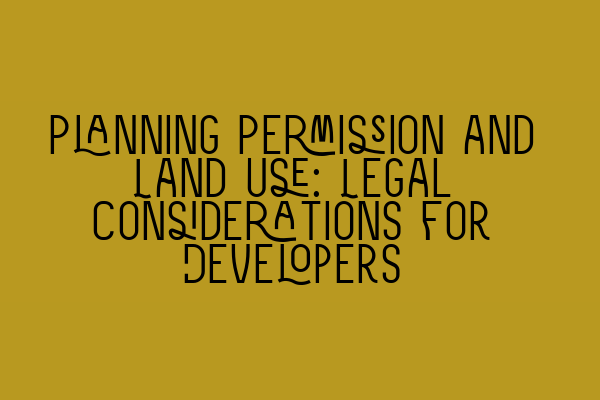Planning Permission and Land Use: Legal Considerations for Developers
As a developer, navigating the complex world of planning permission and land use is crucial to the success of your projects. Understanding the legal considerations involved is essential to ensure compliance with regulations and avoid any potential legal pitfalls. In this blog post, we will explore some of the key aspects of planning permission and land use that developers need to be aware of.
1. Understanding Planning Permission
Planning permission is the legal consent required from the local planning authority for certain types of development. It ensures that any proposed changes to land or property are in line with the local planning policies and regulations. It is important to note that not all developments require planning permission, as there are certain exemptions and permitted development rights in place.
2. The Planning Application Process
The planning application process involves submitting detailed plans and documents to the local planning authority for review. This typically includes information such as architectural drawings, site plans, and supporting documents. The authority will assess the application against various criteria, including the impact on the local area, sustainability, and compliance with planning policies.
To navigate this process smoothly, it is advisable to engage with experienced planning consultants who can assist with the preparation of the application and provide guidance on any potential issues or concerns.
3. Legal Issues with Planning Permission
Obtaining planning permission is not always straightforward, and there can be various legal issues that developers may encounter. Some common legal considerations include:
a. Local Opposition: Local residents and community groups may object to proposed developments for various reasons, such as concerns over the impact on the local environment or increased traffic. Addressing these concerns and engaging in open dialogue with the local community can help mitigate potential legal disputes.
b. Environmental Impact Assessment (EIA): Large-scale developments may require an EIA to assess and mitigate any potential environmental impacts. Failure to comply with EIA regulations can lead to legal challenges and delays in obtaining planning permission.
c. Planning Obligations: The local planning authority may impose planning obligations, such as contributions towards affordable housing or infrastructure improvements, as a condition for granting planning permission. Developers must carefully consider these obligations and ensure compliance to avoid any legal consequences.
4. Land Use Restrictions and Zoning
In addition to planning permission, developers also need to consider land use restrictions and zoning regulations. These regulations dictate how land can be used and what types of development are permitted in specific areas. Understanding these restrictions is crucial when considering potential development sites and can help avoid costly legal disputes.
5. The Role of Covenants and Restrictions
Covenants and restrictions are legal obligations or conditions that are attached to a property and can limit its use or development. These may be imposed by previous landowners, homeowners associations, or local authorities. Developers must carefully review property titles and conduct thorough due diligence to identify any covenants or restrictions that may impact their proposed development plans.
6. Appealing a Planning Decision
If a planning application is refused or granted with conditions that are deemed unfavorable, developers have the right to appeal the decision. This involves submitting an appeal to the relevant planning inspectorate or tribunal. Engaging an experienced planning lawyer can greatly assist in presenting a strong case during the appeal process.
Conclusion:
When it comes to planning permission and land use, developers must navigate a complex maze of regulations and legal considerations. Understanding the intricacies involved, including the planning application process, legal issues, land use restrictions, and appealing decisions, can help developers ensure compliance and the successful realization of their projects.
If you’re interested in further expanding your legal knowledge for success in your future endeavors, we recommend checking out these related articles:
– 48. Unlocking Legal Research Skills for SQE Success
– 62. SQE2: Everything You Need to Know About the Second Stage Exam
– 53. Functioning Legal Knowledge (FLK): Core Concepts for SQE Candidates
– 65. Case Studies in SQE: Applying Knowledge to Real-Life Scenarios
– 44. Essential SQE Textbooks: Building a Solid Foundation for Exam Prep
At SQE Property Law & Land Law, we are here to provide expert guidance and support for all your property law needs. Contact us today to discuss your development projects and how we can assist you in navigating the legal landscape of planning permission and land use.
